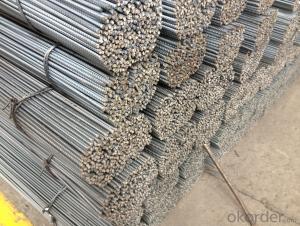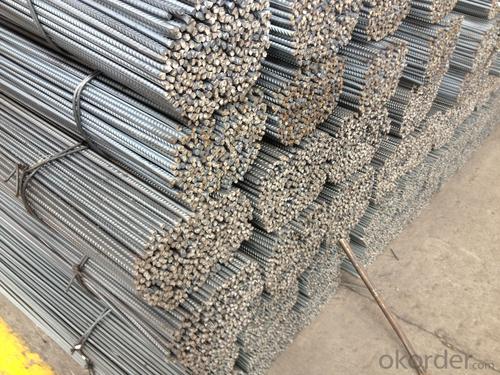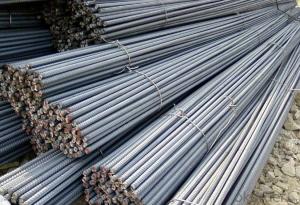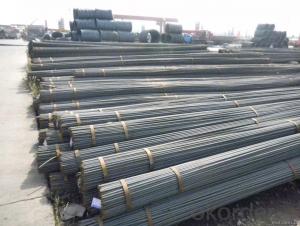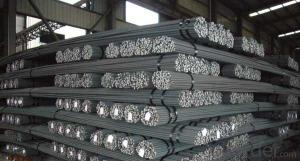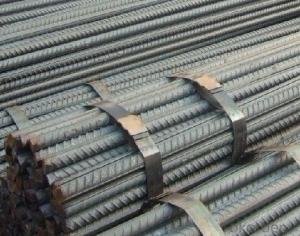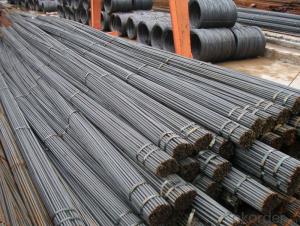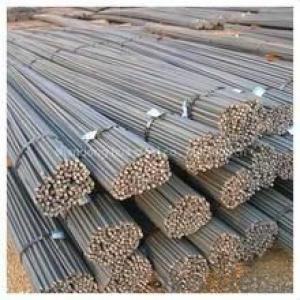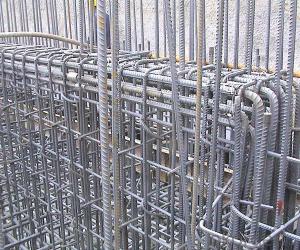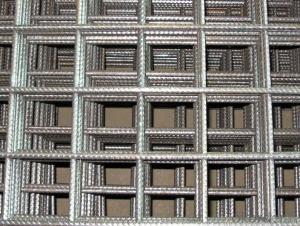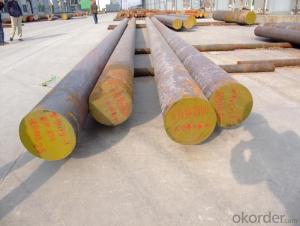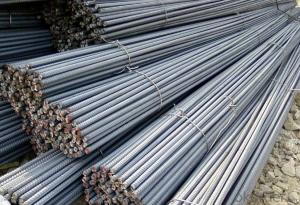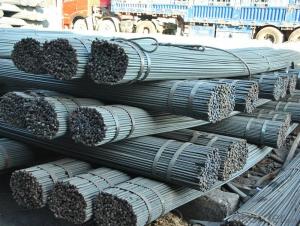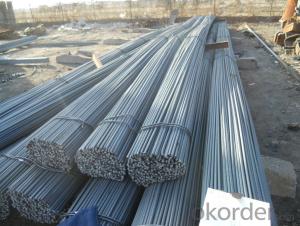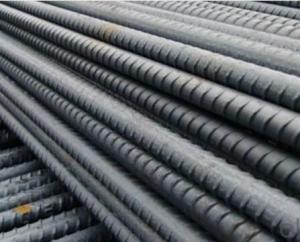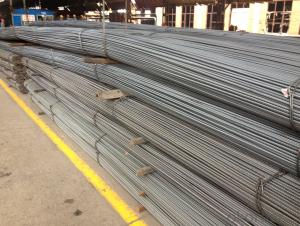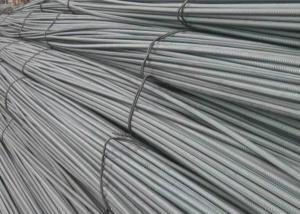Steel Rebar,Reinforcement Steel Bar,Structural Steel bar
- Loading Port:
- China main port
- Payment Terms:
- TT or LC
- Min Order Qty:
- 100 m.t.
- Supply Capability:
- 100000 m.t./month
OKorder Service Pledge
OKorder Financial Service
You Might Also Like
Product Description:
OKorder is offering Steel Rebar,Reinforcement Steel Bar,Structural Steel bar at great prices with worldwide shipping. Our supplier is a world-class manufacturer of steel, with our products utilized the world over. OKorder annually supplies products to African, South American and Asian markets. We provide quotations within 24 hours of receiving an inquiry and guarantee competitive prices.
Product Applications:
Steel Rebar,Reinforcement Steel Bar,Structural Steel bar are ideal for structural applications and are widely used in the construction of buildings and bridges, and the manufacturing, petrochemical, and transportation industries.
Product Advantages:
OKorder's Steel Rebar,Reinforcement Steel Bar,Structural Steel bar are durable, strong, and wide variety of sizes.
Main Product Features:
· Premium quality
· Prompt delivery & seaworthy packing (30 days after receiving deposit)
· Can be recycled and reused
· Mill test certification
· Professional Service
· Competitive pricing
Product Specifications:
Manufacture: Hot rolled
Grade: HRB335,HRB400,HRB500
Certificates: ISO, SGS, BV, CIQ
Length: 6m – 12m, as per customer request
Packaging: Export packing, nude packing, bundled
Deformed Steel Bar | ||
Diameter (MM) | Cross Sectional Area (MM2) | Theorectical Weight (KG/M) |
6 | 28.27 | 0.222 |
8 | 50.27 | 0.395 |
10 | 78.54 | 0.617 |
12 | 113.1 | 0.888 |
14 | 153.9 | 1.21 |
16 | 201.1 | 1.58 |
18 | 254.5 | 2 |
20 | 314.2 | 2.47 |
22 | 380.1 | 2.98 |
25 | 490.9 | 3.85 |
28 | 615.8 | 4.83 |
32 | 804.2 | 6.31 |
36 | 1018 | 7.99 |
40 | 1257 | 9.87 |
FAQ:
Q1: How many tons of steel products could be loaded in containers?
A1: Usually the steel products are delivered by bulk vessel because of the large quantity and the freight. However, there are no bulk vessel enter some seaports so that we have to deliver the cargo by containers. The 6m steel product can be loaded in 20FT container, but the quantity is changed according to the size, usually from 18tons to 25tons.
Q2: How do we guarantee the quality of our products?
A2: We have established an advanced quality management system which conducts strict quality tests at every step, from raw materials to the final product. At the same time, we provide extensive follow-up service assurances as required.
Q3: How soon can we receive the product after purchase?
A3: Within three days of placing an order, we will arrange production. The normal sizes with the normal grade can be produced within one month. The specific shipping date is dependent upon international and government factors, the delivery to international main port about 45-60days.
Images:
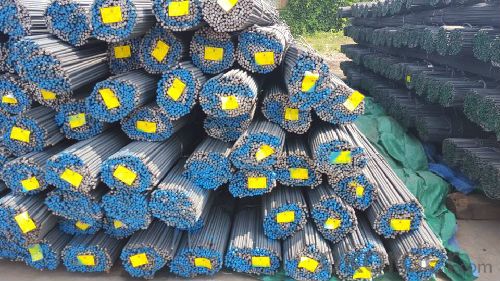
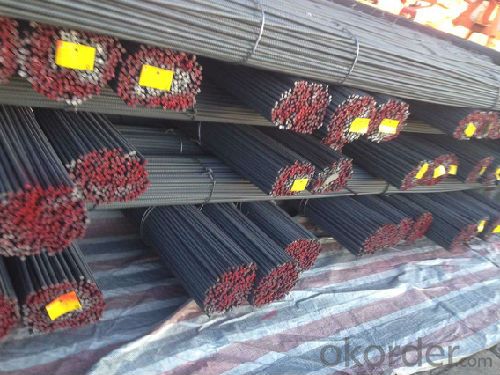
- Q: Can steel rebars be painted or coated for aesthetic purposes?
- Yes, steel rebars can be painted or coated for aesthetic purposes. Painting or coating steel rebars can help improve their appearance and blend them with the surrounding structures or environment. The paint or coating can be chosen to match the desired color or style, allowing the rebars to be seamlessly integrated into the overall design. Additionally, painting or coating the rebars can also provide a layer of protection against corrosion and extend their lifespan. However, it is important to note that the paint or coating used should be specifically designed for steel and capable of adhering well to the surface, ensuring durability and longevity.
- Q: Do l 8, three grade steel have discs?
- If small specifications or hot rolled straight line, the cost is high, not to say, production is still low, the general steel mills in order to produce the production of discoid small threads, and then according to the needs of the use of mechanical processing into a straight bar shape
- Q: How are steel rebars stored and transported?
- Steel rebars, also known as reinforcing bars, are commonly used in construction projects to provide strength and stability to concrete structures. Proper storage and transportation of steel rebars is essential to maintain their quality and prevent any damage or accidents. When it comes to storage, steel rebars are typically stored in a designated area, commonly known as a rebar yard or laydown yard. This area should be clean, well-drained, and free from any debris or organic materials. Rebars are usually stacked in bundles or placed on elevated racks to prevent contact with the ground, which could cause corrosion or contamination. To ensure safety and ease of access, rebars should be organized and labeled based on their sizes and grades. This helps construction workers identify and retrieve the required rebars efficiently without causing any disruption or delays in the project. In terms of transportation, steel rebars are often loaded onto trucks or trailers for delivery to construction sites. It is crucial to secure the rebars properly during transportation to prevent any shifting or movement that could cause damage to the rebars or compromise the safety of the vehicle. Rebars can be transported in various ways, depending on their length and quantity. They can be bundled together using wires, straps, or steel bands to keep them in place. Additionally, wooden or metal supports can be used to prevent the rebars from bending or sagging during transit. During transportation, it is important to consider weight restrictions and road regulations to ensure compliance and safety. If rebars need to be transported over long distances, it is essential to coordinate with logistics companies that specialize in handling heavy and oversized cargo. In summary, steel rebars are stored in designated areas such as rebar yards, where they are stacked, labeled, and protected from corrosion and contamination. When it comes to transportation, rebars are secured using wires, straps, or steel bands and loaded onto trucks or trailers. Proper handling and adherence to regulations are crucial to ensure the safety and integrity of the rebars during storage and transportation.
- Q: What is the thermal expansion coefficient of steel rebars?
- The thermal expansion coefficient of steel rebars typically ranges between 10 and 12 x 10^-6 per degree Celsius.
- Q: What is the role of steel rebars in preventing shrinkage cracks in concrete?
- Steel rebars play a crucial role in preventing shrinkage cracks in concrete. Shrinkage cracks occur in concrete due to the natural drying and curing process, as the water content in the concrete evaporates and the material contracts. These cracks can compromise the structural integrity and durability of the concrete. The inclusion of steel rebars in concrete helps to mitigate shrinkage cracks by providing tensile strength. While concrete is strong in compression, it is weak in tension. During the drying process, the rebars act as reinforcement, resisting the tensile forces that develop as the concrete shrinks. This prevents the formation and propagation of shrinkage cracks. The rebars act as a framework or skeleton within the concrete, distributing the tensile stresses and preventing them from concentrating in one area. By restraining the shrinkage of the concrete, the rebars help to maintain the overall integrity and stability of the structure. In addition, steel rebars also enhance the overall strength and load-bearing capacity of the concrete. By adding reinforcement, the concrete becomes more resistant to bending, shearing, and other forces that can lead to cracking. Furthermore, the presence of rebars in concrete also helps to control the width and depth of any cracks that may still occur. By confining and limiting the size of cracks, the rebars prevent them from expanding and potentially compromising the structural integrity of the concrete. In summary, steel rebars play a crucial role in preventing shrinkage cracks in concrete by providing tensile strength, distributing the stresses, enhancing overall strength, and controlling the size of cracks. Their inclusion in concrete ensures a more durable and reliable structure, minimizing the risk of damage and maintaining the longevity of the concrete.
- Q: Can steel rebars be used in the construction of dams or reservoirs?
- Indeed, dams or reservoirs can utilize steel rebars in their construction. It is customary to employ steel rebars as reinforcement in concrete structures, such as dams and reservoirs, to bestow them with robustness and steadfastness. These rebars serve to evenly distribute and combat the tensile forces that may arise within these structures due to water pressure and external burdens. Steel rebars possess resistance to corrosion, durability, and commendable tensile strength, rendering them a perfect choice for such purposes. Moreover, their malleability and ease of installation grant flexibility in the design and construction phases.
- Q: How do steel rebars improve the ductility of concrete?
- Concrete's ductility is enhanced by steel rebars in several ways. Firstly, the distribution and dissipation of stress throughout the concrete structure is facilitated by the presence of rebars. This prevents the concentration of loads in specific areas, thus preventing cracks or fractures and improving overall ductility. Secondly, when concrete undergoes tension or bending forces, rebars act as reinforcement to resist these forces. The tensile strength of steel rebars is higher compared to concrete, which is weak in tension. This reinforcement allows concrete to withstand higher tensile stresses without breaking, thereby increasing ductility. Furthermore, the bond between steel rebars and the concrete matrix plays a crucial role in improving ductility. The rough surface of rebars provides better adhesion with the surrounding concrete, increasing stress transfer between the two materials. This bond ensures that rebars do not slip out of the concrete during deformation, maintaining structural integrity and enhancing the ductility of the composite material. Additionally, the presence of steel rebars contributes to the post-cracking behavior of concrete. When cracks develop under high loads, rebars help hold the concrete together and prevent further crack propagation. This post-cracking behavior enables concrete to maintain its load-bearing capacity even in a damaged state, thereby improving overall ductility. In conclusion, steel rebars improve concrete's ductility by distributing stress, resisting tension and bending forces, enhancing the bond between concrete and rebars, and providing post-cracking reinforcement. These combined effects result in a more flexible and durable concrete structure capable of withstanding deformation without catastrophic failure.
- Q: What are the typical costs associated with using steel rebars in a construction project?
- The typical costs associated with using steel rebars in a construction project can vary depending on several factors. These factors include the size and type of the rebar, the quantity needed, the market conditions, and the location of the project. The cost of steel rebars is usually determined per ton or per linear foot. The price per ton can range from $400 to $600, while the price per linear foot can be anywhere between $0.75 to $1.50. It is important to note that these prices are approximate and can fluctuate based on market demand and availability. Additionally, there may be additional costs involved in the procurement and handling of steel rebars. This can include transportation fees, storage costs, and any necessary equipment or tools required for installation. Other cost considerations may include labor expenses for cutting, bending, and placing the rebars, as well as any reinforcement detailing required by the project's design specifications. These costs can vary depending on the complexity of the project and the skill level of the laborers involved. It is also essential to factor in any potential wastage or scrap material that may occur during the construction process. Proper planning and accurate measurements can help minimize these costs. Overall, the typical costs associated with using steel rebars in a construction project can be significant, but they are necessary for ensuring structural integrity and reinforcement. It is advisable to obtain quotes from multiple suppliers and contractors to ensure competitive pricing and to carefully consider the specific requirements of the project before finalizing the budget.
- Q: Can steel rebars be used in parking garage construction?
- Yes, steel rebars can be used in parking garage construction. Steel rebars are commonly used in reinforced concrete structures, including parking garages, to provide additional strength and durability. Rebars help to distribute the load and enhance the structural integrity of the concrete, making it capable of withstanding heavy loads, such as those encountered in parking garages. The use of steel rebars in parking garage construction is essential for ensuring the longevity and safety of the structure.
- Q: How do steel rebars contribute to the overall architectural design of a structure?
- Steel rebars contribute to the overall architectural design of a structure by providing strength, durability, and reinforcement. They are used to reinforce concrete and enhance its structural integrity, allowing for the construction of taller buildings and longer spans. Steel rebars also help distribute loads evenly, increasing the building's resistance to earthquakes and other external forces. Additionally, rebars can be shaped and positioned in various ways to create unique architectural elements and designs, adding aesthetic value to the structure.
Send your message to us
Steel Rebar,Reinforcement Steel Bar,Structural Steel bar
- Loading Port:
- China main port
- Payment Terms:
- TT or LC
- Min Order Qty:
- 100 m.t.
- Supply Capability:
- 100000 m.t./month
OKorder Service Pledge
OKorder Financial Service
Similar products
Hot products
Hot Searches
Related keywords
